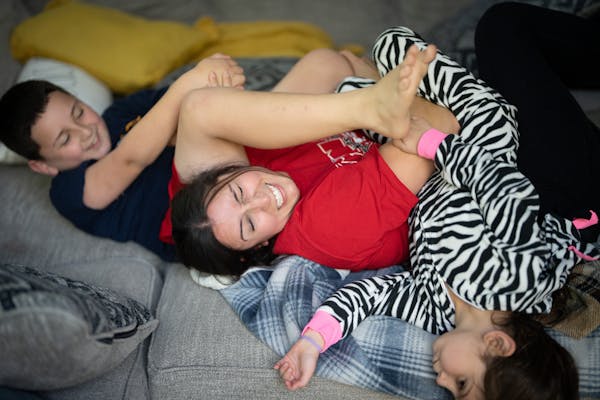A looming strike by 400 Twin Cities mental health workers underscores the pressure hospitals are under as patients with complex psychiatric conditions clog up emergency department and inpatient beds.
A chronic shortage of psychiatric beds in Minnesota has left hospitals boarding patients in mental health crises in their ERs for hours, days or even weeks. But COVID-19 increased depression and anxiety in the community, which in turn put more pressure on a burned-out hospital workforce, according to workers preparing for next week's three-day strike.
"We've already lost too many good workers because of the challenges we are facing, and we are ready to strike for the health, safety and dignity of ourselves and our patients," said Dana Disbrow, a psychiatric associate at M Health Fairview's University of Minnesota Medical Center.
The strike starting Oct. 3 involves the U hospital along with Allina Health's Abbott Northwestern Hospital in Minneapolis and the Fridley campus of Mercy Hospital.
Health officials said problems have worsened during the pandemic to increase pressure on hospitals, including a lack of outpatient care. More than 30% of Minnesota adults with symptoms of depression and anxiety were unable to access counseling or therapy when they needed it in the 12 months ending October 2021, according to the Kaiser Family Foundation.
The unmet need sent more people in crises to hospital with limited capacities. A survey by the Minnesota Department of Health found on one day in May that 77 people with mental health treatment needs were waiting in ERs for beds to open up — just in Twin Cities-area hospitals with psychiatric units.
Hospitals have responded with plans to increase psychiatric capacity. Children's Minnesota is slated to open a pediatric inpatient unit in St. Paul later this fall. And the state health survey was part of the approval process allowing Fairview and Acadia Healthcare to build a 144-bed psychiatric hospital at the Bethesda campus in St. Paul. The facility will partly replace the shuttered St. Joseph's Hospital in St. Paul, where Fairview operated more than 100 psychiatric beds before its closure.
Mental health workers argued that better pay, benefits and safety guarantees are needed as well, given the rising complexity of patients with psychiatric conditions who are admitted to hospitals. The burnout risk shows in the rising number of job openings for psychiatric technicians in Minnesota. The 402 openings at the end of 2021 represented 20% of all jobs, according to the Minnesota Department of Employment and Economic Development.
At the same time as it worsened staffing shortages, COVID-19 also stoked public sentiment in favor of unions and the protection of workers who encountered furloughs and other disruptions during the pandemic.
The Allina and Fairview mental health workers voted to join the SEIU Healthcare union in October 2021 but haven't reached their first contract, even after a one-day strike in May.
The latest SEIU action comes less than a month after 15,000 Twin Cities and Duluth-area hospital nurses went on strike for three days.
A statement from Allina said it can often take a year to reach contracts with newly organized groups, such as the mental health workers. Talks are scheduled this week and into next month to try to reach a deal.
"Striking does not benefit anyone," the Allina statement said. "However, we will be prepared to continue caring for our community in the event a settlement is not reached."
Fairview is developing a "contingency plan" if negotiations fail to avert a strike, according to a statement from the health system.
"Care will continue to be provided in our inpatient mental health units if an agreement isn't reached by next week."

Minnesota State Patrol celebrates diverse new class of troopers

Fired Mpls. teacher accuses management of 'cancerous rot'

Jill Biden rallies women, teachers for the Biden-Harris ticket in Bloomington speeches
Neighbors, city officials at odds over Rochester lake dam

